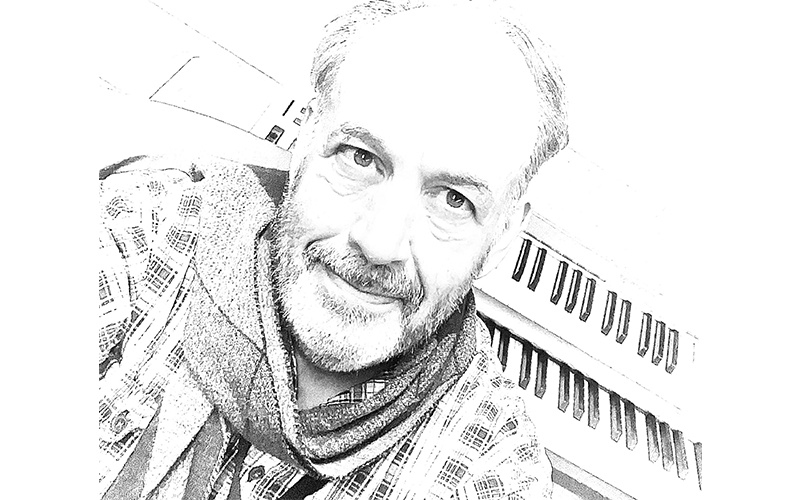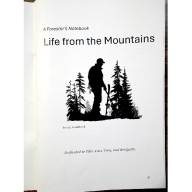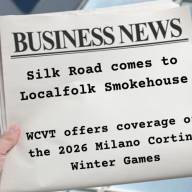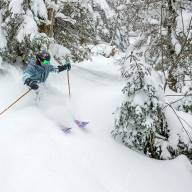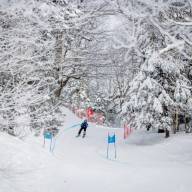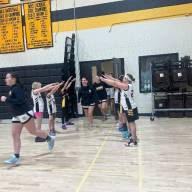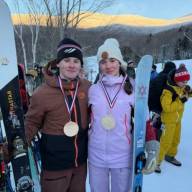Harwood Union is renown for its award-winning jazz program and the teacher behind that well-deserved reputation, Bruce Sklar, is retiring at the end of this year. Sklar agreed to an interview with The Valley Reporter ahead of one final jazz night at the school with friends, peers and students on February 9.
VR: How many years have you been at Harwood?
BS: I started on staff full time in 1999. But I've been doing jazz there at some level since 1994, or something like that. Chris Rivers heard of me from a student of his who was also a student of mine. Chris brought me in and started doing jazz band. At that point, it was grades seven through 12. So, the first major change was to start a middle school jazz band as well which was wild. I wasn't trained as a teacher; I sort of was figuring it out as I went.
VR: Tell me about how you came to Vermont and your educational background.
BS: I went to UMass Amherst, and actually was the first person that graduated with a performance jazz degree from UMass Amherst. They didn't really have a jazz program, which you could actually major in until, at some point, after I started. I sort of bounced back and forth between a few schools, but I started at UMass. But I had to enter as a classical major, because at the time I was taking my auditions, the program had not started yet. I started school in the fall of 1974.
I had always come up to Vermont. I’m from Newton originally. I have good friends who had ski houses in the Mad River Valley and had been coming up and being involved with the Fourth of July in Warren since 1974. I ended up marrying somebody from The Valley, bought a house in Moretown and raised my family there. I came up to join the band Pure Pressure. That's why I moved to Vermont. I was teaching private lessons as well. I had been involved in Harwood for about, I guess, five or six years when Chris said, and also the principal said, they were likely going to create a position for me.
VR: And tell me about how you ended up a musical kid?
BS: Music was of high value in my family. There was my grandmother's cousin Lillian Rock, who was a major star in like the 1930s and 1940s. There was always the family idea that we have this as a value in the family. The idea of jazz theory attracted me when I was like 12. I walked down to Newton Center and there was a music store called Kota Audio. It was a pretty progressive place in a lot of ways. And met the teacher, whose name was Gene Ashton, now known as Cooper Moore, one of the avant-garde in the jazz world. He taught me from when I was 13 to 17 when he finally moved to New York. He gave me everything and, you know, at an age where everything was so visceral more than intellectual in some ways, although it was all about that as well. So that's what got me into it.
VR: You've really developed an incredible program here. It's got an incredible reputation throughout state and beyond. How did that come to be? Is it the students? Was it the combination? Was it the community support? Tell me a little bit about how the thing became the thing.
BS: All of the above. I had a vision about what he wanted to see happen there. He came in as a young teacher, right off his master's degree in teaching, and really set things up. He saw that jazz was part of the program that he wanted to have at Harwood. He could see that I actually was good in front of a group of kids that I knew how to how to do that, even though I never had any practicum in any way, shape, or form about being in school student teaching.
VR: Did you just make it up as you went?
BS: Improvisation is a life skill. It's more than just how you approach music; it's, can you think on your feet, can you read people, read what they need, and all those things I’m able to do fairly readily. And that was recognized. By the time I got offered the job, it was half time the first year, but then they made it full time. I also have expertise in music tech, and that Chris and I started figuring out how to share kids because as jazz band and band actually have always met at the same time. Back in the day, we had a lot more horn players. We had an A band and a B band, both were like pretty much full size, big bands. About five, six years in, I started doing Monday night rehearsals as well. It was a co-curricular. We just did that. And we had the investment from the kids that they would show on Monday night for a couple hours and rehearse. So, a lot of the success had to do with how Chris and I worked it out to cooperate and share the same kids. They had this experience that was quite intense in terms of the depth of what they were getting. Really the basis of it is that we've been able to work cooperatively, and, and have a lot of playing opportunities for kids as much as possible. And certainly, the community support has been phenomenal, all the way along.
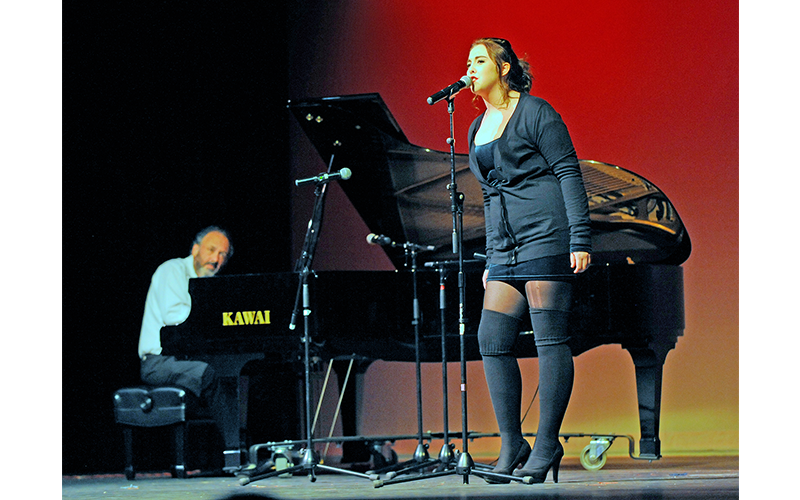
VR: Some of your students are very good friends of mine. I have found myself been enthusiastic about jazz because of the extreme passion you engendered in these kids. It's palpable. How did you do that? You really made jazz come alive not just for the kids but also for their families and community.
BS: There's a whole bunch of things that that happened, like right off the bat, when I was starting. First of all, they had a teacher, Matt Clancy, who was very jazz-minded. I was getting kids that were already exposed to the masters, but there was a culture that happened very quickly, because we had a bunch of kids that could already play like really well, everybody could hear that. So, I could start at a high level right away, and really challenged them That's just the luck of the draw. I was there, I was able to serve them, they were there, they could fully take what I was giving them and run with it as hard as they could, so that the whole program benefited by that because a lot of other kids got more motivated than maybe they would have been otherwise.
VR: You’ve mentored some amazing musicians and then there’s a lot of kids who probably didn't go on to fame and fortune. There are so many kids for whom the structure of Harwood music program really framed and informed their lives and they still play, although they went on to do something completely different. There's a value to the discipline of being a musician. Talk about that a little bit.
BS: I met a former student a few years ago in Waterbury who is now an attorney. He was telling me something he had come up with legally, that nobody had thought of in that way before. It synthesized in his head in the moment. He has the ability to put these ideas together and synthesize something. You know, what that's about? That’s improvisation. It’s a human capability. We happen to apply it to jazz, but it's larger than that. There are plenty of other kids who’ve gone on to do amazing things, engineering, rocket scientist, PhDs and there's a lot of others. It amazes me that people have those sorts of abilities and that sort of focus. But they all were way into this and just had that natural propensity to be able to improvise.
VR: Yeah, that's interesting. People tend to think of, like, straight up academics, as straight up academics. And I think there is often a missing connection between the value of as you say, being able to improvise, but being able to think three-dimensionally. It's a different way of thinking three-dimensionally.
BS: Yes, yes, absolutely. I mean, a lot of it is, coming from a very intellectual point of view when you're sitting down to actually figure this stuff out. But when you're playing with a bunch of people, this is what I talk about with all my groups, is that the synchronization, rhythmic synchronization is this thing that human beings can do. And there's been a lot of poking under the hood by scientists about this for a long, long time and sticking people in the MRI machines and measuring their brains when they're singing, either alone or with other people and watching what goes on. But certainly, when synchronization happens, when a group is hit, something feels different. It's really hard to explain what that is but once that happens, it's like, well, my teacher called it going to the other side. And it's like something's taking over. But when you're improvising and really things are in the groove, other things are taking over. That's practice. That's practice for life in general. I mean, you do that enough, and you start to see that that starts to boil out and boil up in other ways in your life, at least, that's what I've noticed.
VR: One final jazz night in the Harwood auditorium on February 9 at 7 p.m. – what should people expect?
BS: at some point after I had been hired, I decided we needed a jazz night here. After that we have them every so often. This will be my last one. I put the message out to everybody, at least on my Facebook page, that this could be a wild night, and some of them took the ball and they're actually putting something together with alums. It could be wild.


